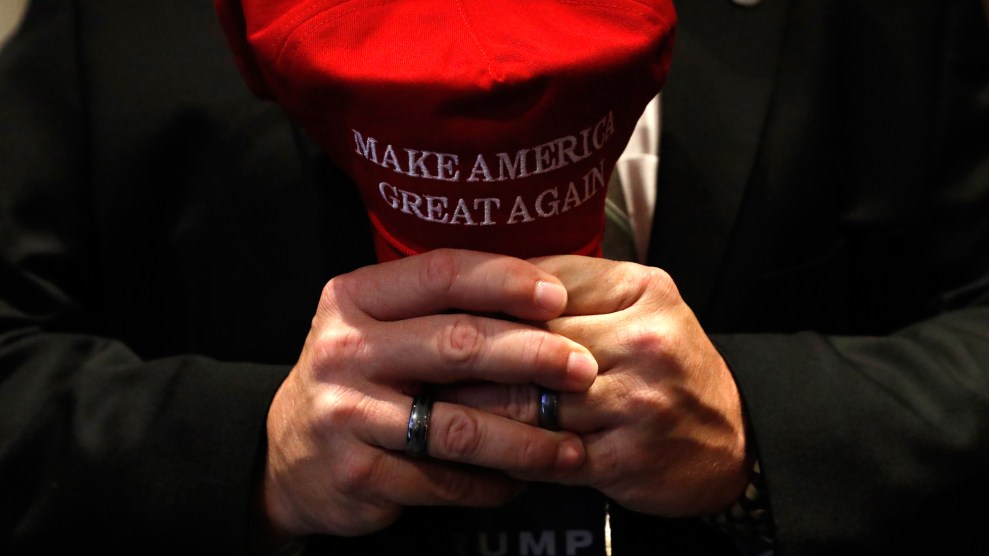Make America Great Again Coined When

Andrew Kelly/Zuma
Facts affair: Sign upwardly for the free Mother Jones Daily newsletter. Back up our nonprofit reporting. Subscribe to our print magazine.
Did you ever wonder why Donald Trump's "Make America Great Once again" slogan took such root amidst the Republican base? Did it symbolize a render to an age when wages were higher and jobs more than secure? Or was information technology coded racial linguistic communication designed to bespeak a rollback to a time when people of colour (and women) knew their place? In the soul-searching and recrimination among Democrats after Hillary Clinton's defeat, both theories have their champions.
Merely a closer look at conservative rhetoric in recent years reveals that "Make America Bully Again" was not Trump's invention. It evolved from a phrase that became central to the Republican establishment during the Obama years: "American exceptionalism." People often equate the expression with the notion that God fabricated America "a metropolis upon a hill," in the words of the Puritan colonist John Winthrop. Yet, as University of California-Berkeley sociology professor Jerome Karabel noted in a 2011 article, this usage only came into vogue subsequently Barack Obama became president. Previously it was mainly used by academics to mean that America is an exception compared with other Western democracies, for improve or worse, as illustrated past its top-notch universities or its blank-bones gun control.
Prior to 2008, "American exceptionalism" appeared in news manufactures a handful of times a twelvemonth, merely later on Obama was elected the references skyrocketed, largely because of a drumbeat from Republicans. In one case the tea party moving ridge made John Boehner speaker of the House in 2010, for example, he summarized the growing consensus amid Republicans: Obama had turned his back on the Founding Fathers to the signal where he "refused to talk almost American exceptionalism." (In fact, in 2009 the president had stated, "I believe in American exceptionalism.") The phrase's popularity in GOP talking points—oft in attacks on Obama's "socialist" policies—paralleled the spread of conspiracy theories about his citizenship and supposed jihadi sympathies.
Defending "American exceptionalism" was a theme of Mitt Romney'due south 2012 entrada; he blasted Obama for supposedly thinking that "America'south just another nation" destined to go "a European-manner entitlement society." Romney's campaign co-chair John Sununu added that Obama should "acquire how to exist an American." (He afterward apologized.)
The 2016 Republican presidential candidates and their surrogates sang the same tune. When Fox News pundit Sean Hannity asked Jeb Bush for his thoughts on exceptionalism, Bush replied, "I do believe in American exceptionalism," unlike Obama, who "is disrespecting our history and the extraordinary nature of our country." Rudy Giuliani was more explicit. "I do non believe that the president loves America," he asserted, suggesting Obama did non retrieve "we're the most exceptional country in the globe." During a speech a calendar month later in Selma, Alabama, the president pointed out that the ongoing fight for civil rights is a cornerstone of what makes America exceptional.
To go more of a quantitative sense of the phrase's evolution, I analyzed the Republican Party platform. All party platforms typically emphasize organized religion in American greatness, but between 1856 and 2008, the GOP never used the expression "American exceptionalism" or even the adjective "exceptional" to describe the land. Past contrast, the final section of the 2012 Republican platform lambasting the Obama presidency was titled "American exceptionalism." The 2016 platform put the phrase into the kickoff line of its preamble: "We believe in American exceptionalism." The evolution of "American exceptionalism" into an anti-Obama rallying cry with nativist overtones evoked earlier appeals to "states' rights" to rouse whites resenting the stop of segregation.
In his book Time to Go Tough: Making America #one Again, Trump, too, framed his agenda as a defence of "American exceptionalism." "Possibly my biggest beef with Obama is his view that there's nothing special or exceptional about America—that we're no dissimilar than any other land." Trump later adopted a catchier slogan, "Make America Great Again," but it retained the nativist overtones and racial dog whistles of the beginning. Paired with Trump's open conspiracy-mongering about Obama'due south forged nativity certificate and supposed Muslim faith, it amplified and dramatized the Republican institution'southward slyer assertions about Obama's un-American values.
Trump would eventually abandon canis familiaris whistles in favor of blunter race-baiting. What remains to exist seen is whether he and the Republican institution volition proceed flashing the "exceptionalism" point in the post-Obama years—to paint new opponents every bit un-American—or whether that language was uniquely deployed to delegitimize the nation'due south starting time blackness president. At the very to the lowest degree, information technology provided fertile ground for Trumpism.
reinhartbesse1954.blogspot.com
Source: https://www.motherjones.com/politics/2017/01/american-exceptionalism-maga-trump-obama/
Belum ada Komentar untuk "Make America Great Again Coined When"
Posting Komentar